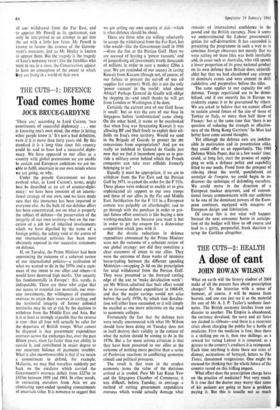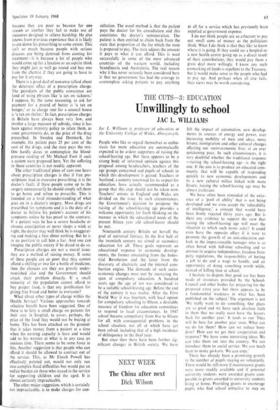A dose of cant
THE CUTS-2: HEALTH
JOHN ROWAN WILSON
What on earth will the history student of 2068 make of all the present fuss about prescription charges? To the historian with a sense of humour, of course, it will be manna from heaven, and one can just see it as the material for one of Mr A. J. P. Taylor's sardonic foot- notes. The British economy lurches from one disaster to another. The Empire is abandoned, the currency devalued, the navy and air force are slashed to ribbons—and there is a recurrent crisis about charging the public for a bottle of medicine. First the medicine is free; then there is a shilling put on it, then two shillings; as a reward for voting Labour it is removed; as a gesture to the country's creditors it is reimposed. Each time anything is done there are cries of dismay, accusations of betrayal, letters to The Times, threatened resignations. One might be excused for thinking that the whole future of the country rested on this trifling impost.
What effect does the prescription charge have on the practice of medicine? Not very much. It is true that the doctor may worry that some of his patients are going to have a problem paying it. But this is usually not so much because they are poor as because for one reason or another they fail to make use of measures designed to relieve hardship. He also knows from previous experience that it is likely to cut down his prescribing to some extent. This isn't so much because people with serious diseases are being deterred from coming for treatment—it is because a lot of people who would come up for a laxative or an aspirin think they might just as well go round and buy one from the chemist if they are going to have to pay for it anyway.
There is a good deal of nonsense talked about the deterrent effect of a prescription charge. The guardians of the public conscience are fond of using phrases like 'a tax on sickness.' I suppose, by the same reasoning, to ask for payment for a pound of butter is 'a tax on hunger,' or to charge rent for a council house is 'a tax on shelter.' In fact, prescription charges in Britain have always been very low, and involve a large measure of subsidy, since it has been against ministry policy to relate them, as some governments do, to the price of the drug prescribed. In Sweden and Denmark, for example, the patient pays 25 per cent of the cost of the drugs, and the state pays the rest. One hardly dares to contemplate the blood- pressure reading of Mr Michael Foot if such a system were proposed here. Yet the suffering in those countries is not readily apparent.
The other traditional piece of cant one hears about prescription charges is that if free pre- scriptions lead to excessive prescribing, it is the doctor's fault; if these people come up to the surgery unnecessarily he should simply tell them to go home and refuse to prescribe. This is founded on a total misunderstanding of what goes on in a doctor's surgery. Most drugs are prescribed for symptoms and it is the duty of a doctor to believe his patient's account of his symptoms unless he has proof to the contrary. -If a patient says he has a severe headache or chronic constipation or never sleeps a wink at night, the doctor may well think he is exaggerat- ing and making a fuss about nothing. But he is in no position to call him a liar. And one can imagine, the public outcry if he dared to do so.
Prescription charges are not a moral issue; they are a method of raising money. If some of these people are so poor that they cannot afford a shilling or two for a bottle of medicine, then the chances are they are grossly under- nourished also and the Government should attack their problem directly. If a small minority of the population cannot afford to buy proper food, is that any justification for giving free bread and butter to everyone?
What about other types of charge within the Health Service? Various approaches towards selective benefit have been suggested. One of these is to levy a small charge on patients for their stay in hospital, to cover, perhaps, the price of the food they would not be buying at home. This has been attacked on the grounds that it takes money from a patient at a time when his earning capacity is least and would add to his worries at what is in any case, an anxious time. There seems to be some force in this. Another suggestion is that people who can afford it should be allowed to contract out of the service. This, as Mr Enoch Powell has effectively pointed out, would not only run into complex fiscal difficulties but would put an unfair burden on those who stayed in the service for supporting children and the aged. It is almost certainly impracticable.
The other major suggestion, which is certainly not impracticable, is to make charges for con-
sultation. The usual method is that the patient pays the doctor for his consultation and this constitutes the doctor's remuneration. The patient is then entitled to claim back from the state that proportion of the fee which the state is prepared to pay. The state adjusts the amount it pays to what it can afford. This is used successfully in some of the most advanced countries of the western world, including Scandinavia and Australasia. The real reason why it has never seriously been considered here is that no government has had the courage to contemplate asking patients to pay anything at all for a service which has previously been supplied at government expense.
I do not think people are so,reiuclant to pay out small sums of money as the politicians think. What I do think is that they like to know where it is going. If they could see a hospital or a new health centre going up as a direct result of their contributions, they would pay them a great deal more willingly. I know any such earmarking of funds is repellent to the Treasury. but it would make sense to the people who had to pay up. And perhaps when all else fails, their views may be worth considering.



































 Previous page
Previous page